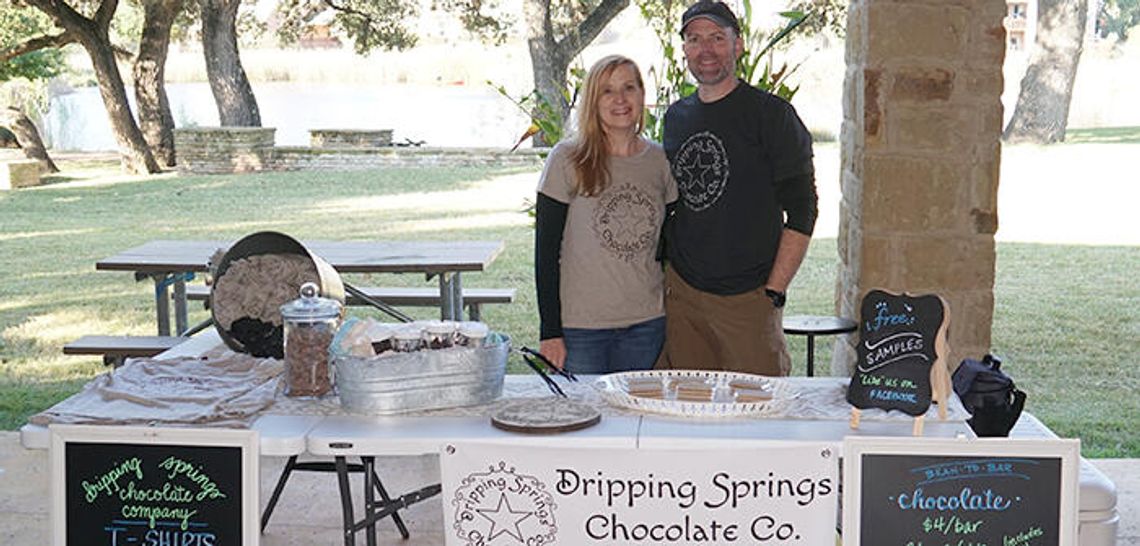[dropcap]D[/dropcap]uring a mission trip to Nicaragua two and a half years ago, Dripping Springs resident Bob Wilson and his family saw the extensive poverty that gripped the country.
Returning to America, the Wilsons were determined to do something about it that went beyond just giving to charity, or opening a coffee shop.
By becoming chocolatiers, Wilson and his wife, Tracey, focused on importing fair-trade, ethnically sourced cacao, or cocoa, beans, which assists farmers in Central American nations.
For Wilson, who owns the Dripping Springs Chocolate Company, the path toward not only his business, but also its success is something that’s been unexpected.
Wilson began by researching details on importing cacao beans for their budding business venture.
What he found, however, was the “dark side” of the industry, where child and slave labor are common, and where farmers often are taken advantage of.
Wilson discovered several suppliers that ensure farmers are treated fairly and are paid fair-market price for their goods.
While it meant a higher price to obtain the beans, the ability to acquire it through free-trade was imperative. At this time, the Wilsons currently buy 200 pounds of beans at a time. A secondary asset was that all of their beans are also organic, which is what they also wanted.
“It’s going to be expensive. It does take a few things, but our primary concern was that it’s ethnically sourced,” Wilson said. “No one is being mistreated and they are getting fair traded.”
Once they found the beans, Wilson and his wife began making investments in their business, which is currently located in their home, now dubbed the “chocolate factory.” Having never worked with chocolate before, the Wilsons purchased books on the art of chocolate-making, along with conducting research on the internet. Bob said that he and his wife are “foodies,” so they were interested in this subject.
They also purchased equipment to help with their endeavor and began making chocolate a year ago.
They quickly realized how labor-intensive chocolate making could be.
“The first several batches were awful,” Wilson said. “The consistency was bad. We realized there’s a lot of steps to making chocolate.”
The process starts by taking the beans and roasting them before they go through a cracking machine. Once there, the beans are winnowed, which separates the husk of the bean from the nibs, which is the inside of the bean.
After winnowing, the beans are then ground to the consistency of coffee grounds, which is a process that can take 24 to 40 hours to complete.
From there, the beans then go through the tempering process, which Bob said was one of the more difficult steps to making chocolate. The process extracts cocoa fat and ensures a smooth, glossy look.
“By the name alone, (chocolate) is very temperamental,” Wilson said.
But finding the right way to temper the chocolate was a “months” long process. During that time, the two went through 40 variations before settling on a way that was consistent and worked with the volume needed.
“Fortunately, if you screw up a batch of chocolate, and it doesn’t temper well, if you don’t have add-ins … you can re-melt it and you don’t have to throw it away,” Wilson said.
Wilson said the company’s mainstay is creating chocolate bars. Wilson said they are playing with the idea of expanding to other confectionary items.
The company tempers a “handful” of four-inch diameter pucks that are 65, 75 and 85 percent cocoa. Each puck contains 36 chocolate bars.
The company began selling its product at the Dripping Springs’ Farmers’ Market and at artisan crafts markets. They have also paried with Texas Hills Vineyard for a chocolate and wine tasting event.
Popularity of the business continues to increase wherever they go, especially when they tell people of the process to make chocolate.
“It’s interesting how many afterwards came up and had more questions,” Wilson said. “Once they hear how much goes into it, they’re intrigued.”
Wilson now eyes expansion in the near future with the move to a new facility along Sportsplex Drive. Once they obtain the ability to sell their product wholesale, the sky could be the limit.
“Two and a half years ago, I didn’t know what to expect,” Wilson said. “I’m thrilled with where it’s at and excited to see where it goes once we can wholesale and can get it out there more.”










